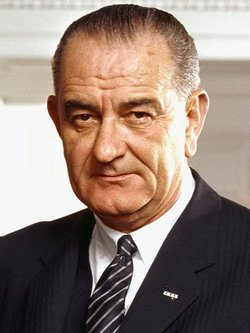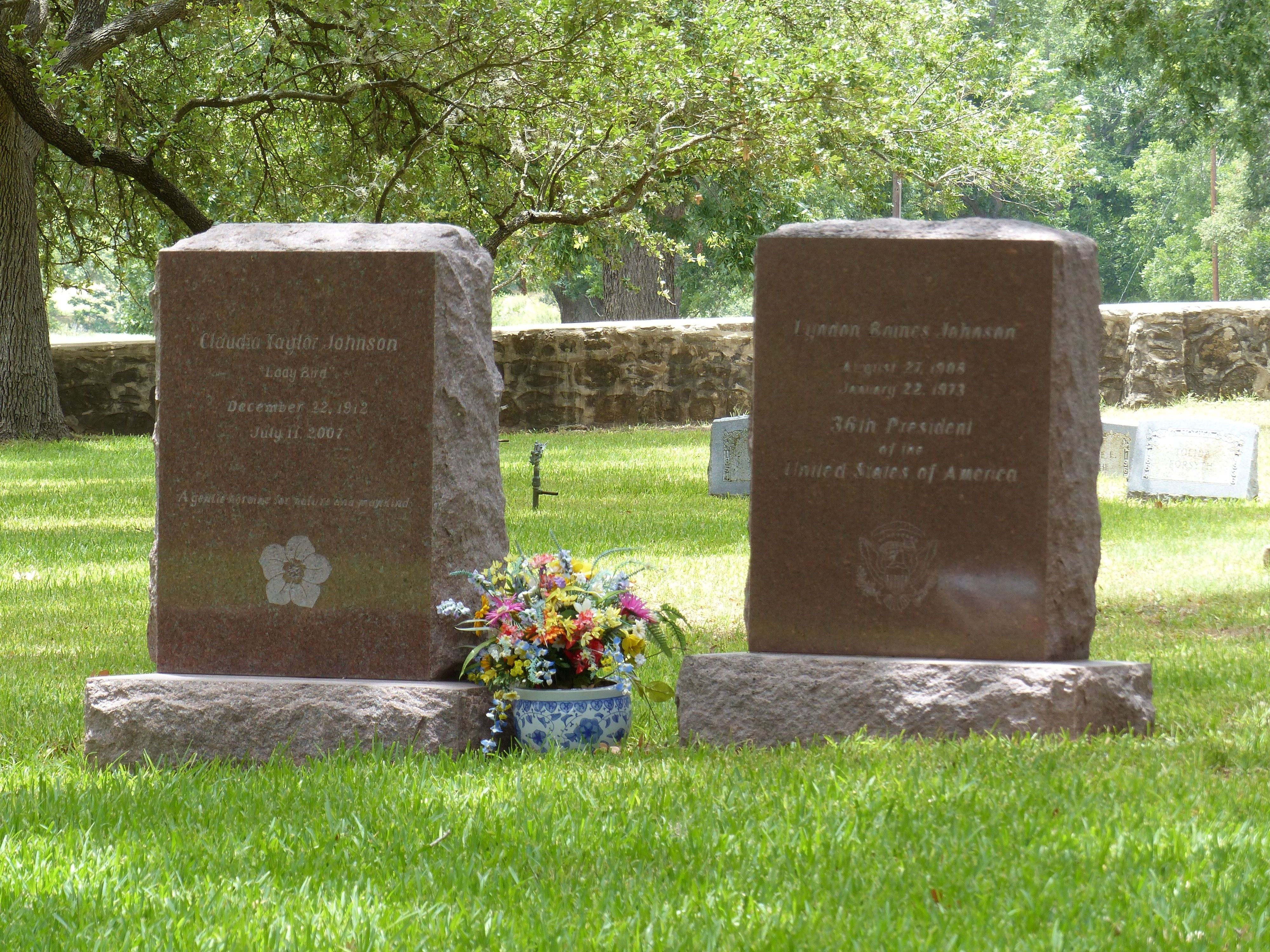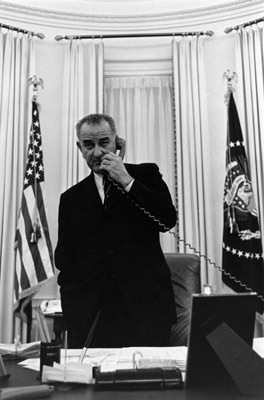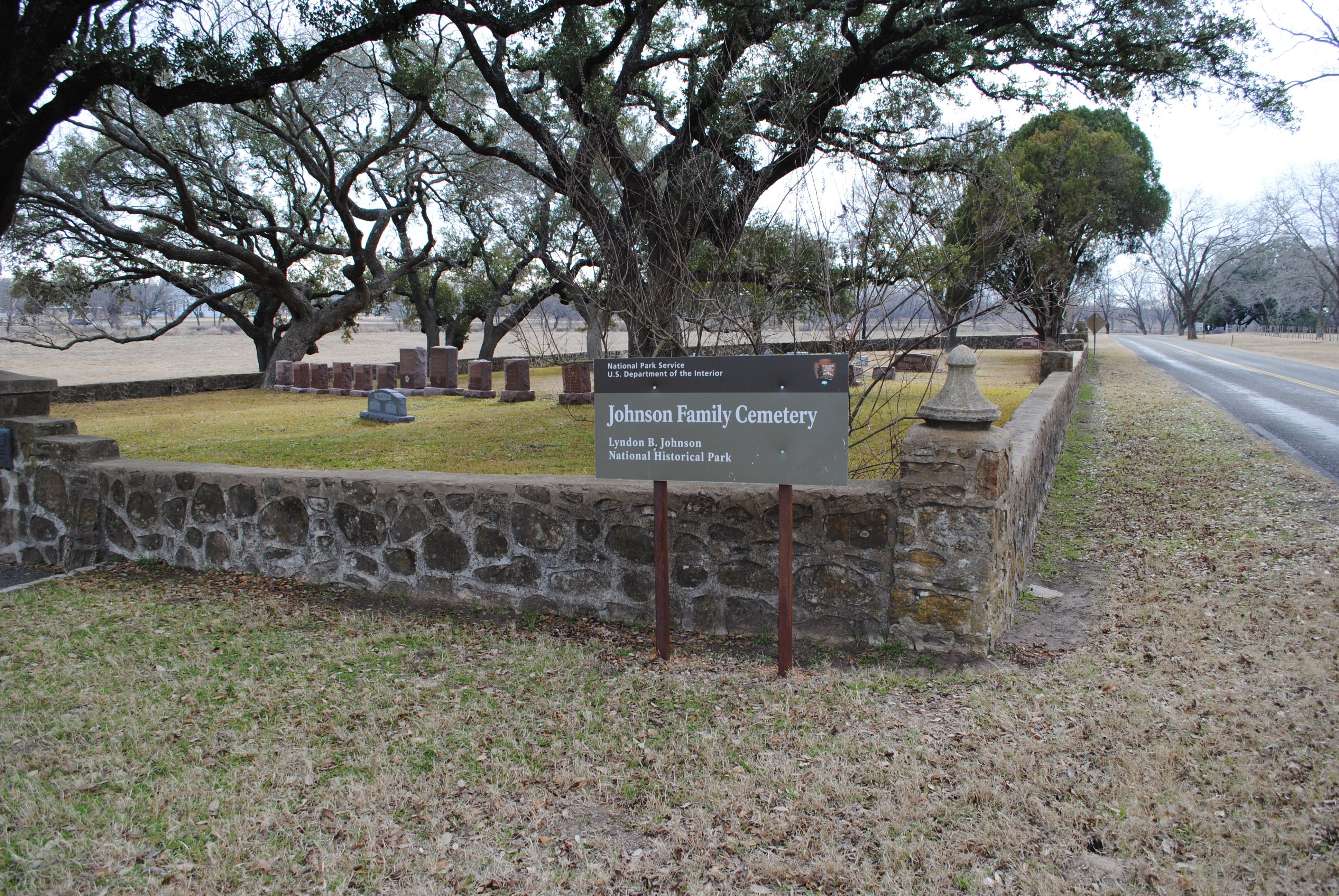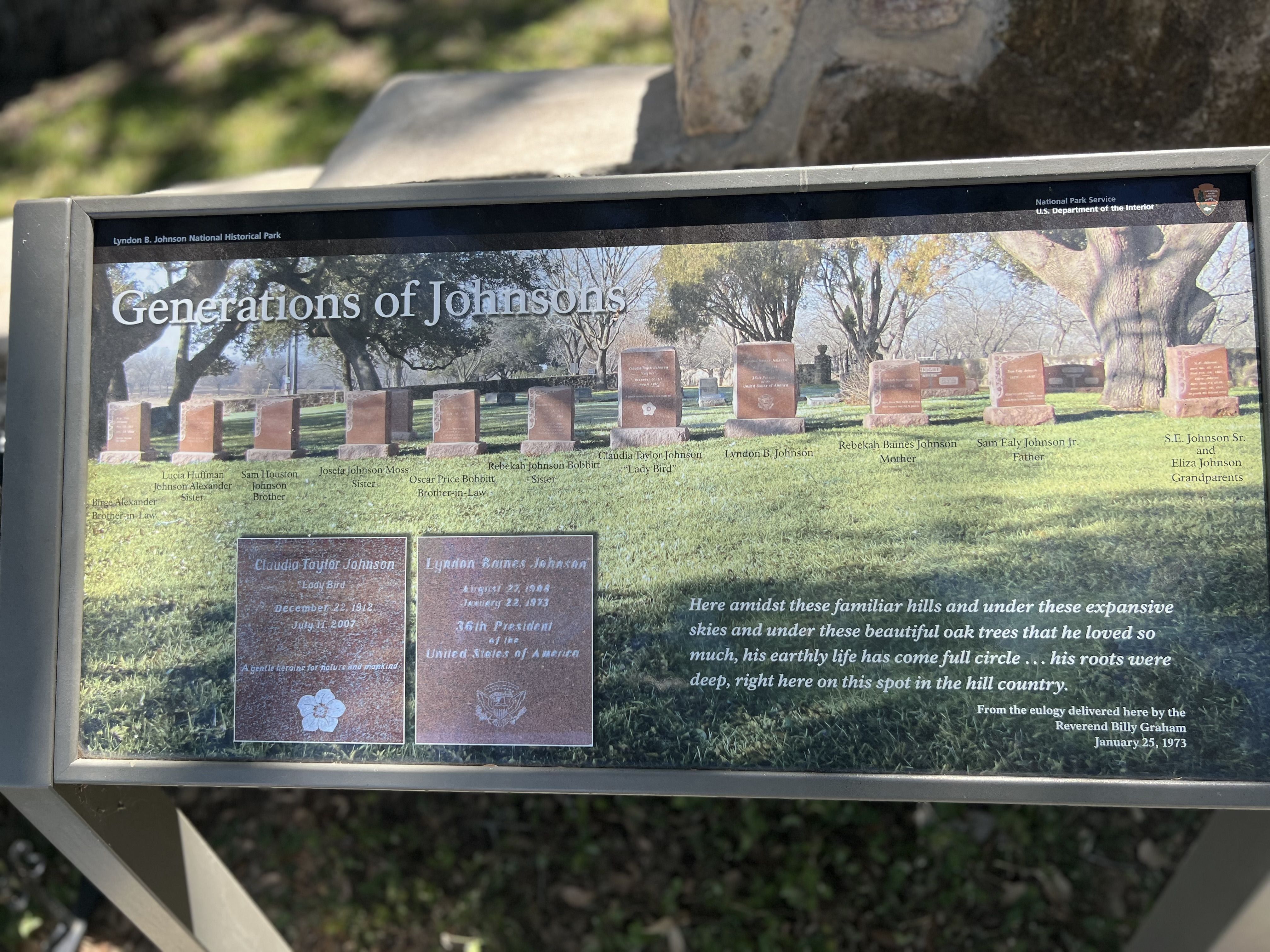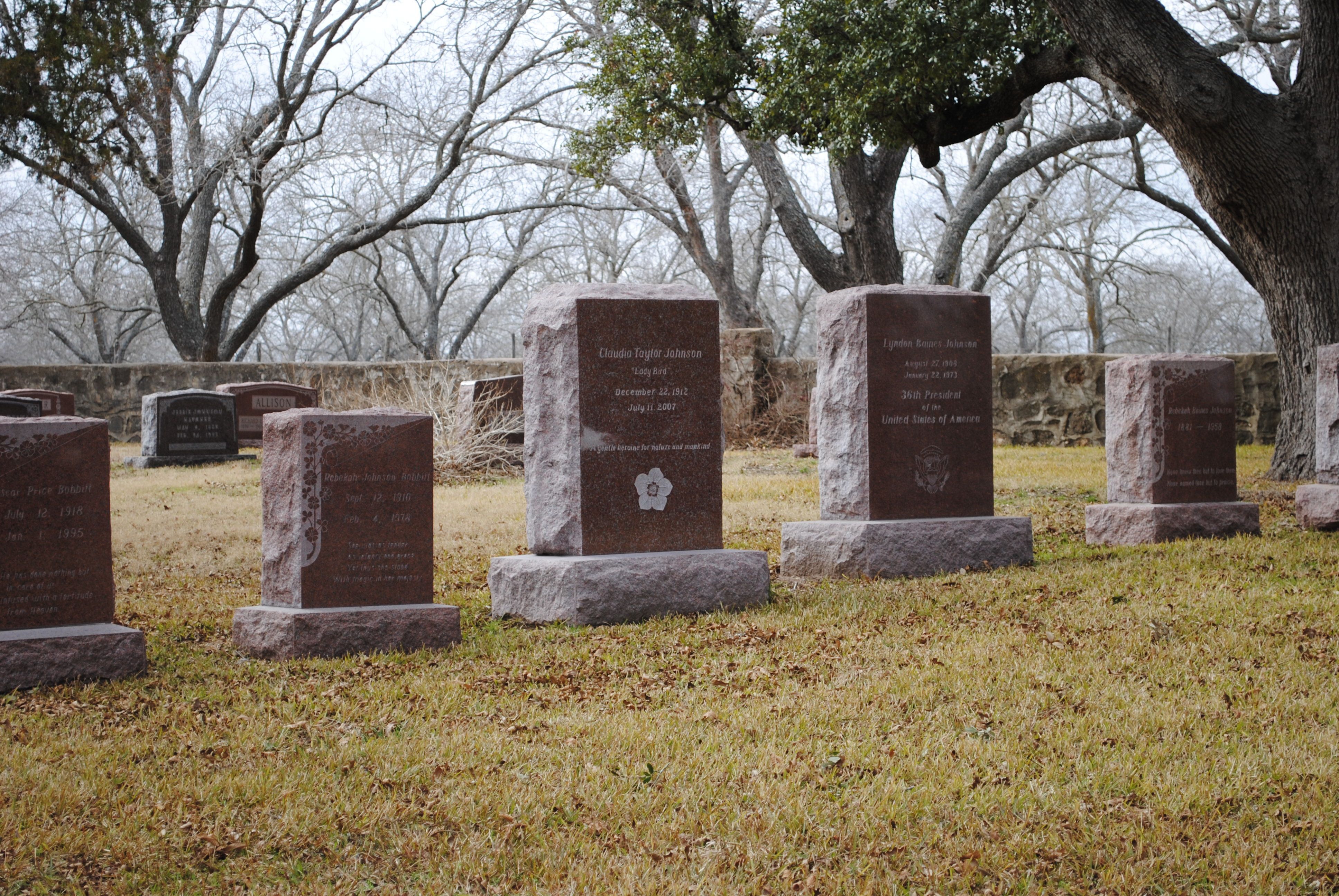36th United States President, 37th United States Vice President, U.S. Congressman, U.S. Senator. His term, served from 1963 to 1969, was marked by widespread unrest due to the unpopular war in Vietnam and by racial and political unrest at home. Born in a Stonewall, Texas farmhouse, the oldest of five children of Samuel Ealy Johnson, a farmer and schoolteacher who served five terms in the Texas House of Representatives. His mother, Rebekah Baines Johnson, was also a schoolteacher. He attended school in nearby Johnson City and in 1924, he graduated from high school at age 15. After a year off, he entered Southwest Texas State Teachers College, where he excelled in campus politics. Graduating in 1930, he taught public speaking and debate at Sam Houston High School in Houston, Texas, before taking a job as secretary to Representative Richard Kleberg, where he learned how to work the politics of Washington, D.C. There he met and married Claudia Alta Taylor (nicknamed Lady Bird) on November 17, 1934. They had two daughters, Lynda Bird and Luci Baines. In 1937, Johnson was elected to Congress and in 1948, he became a Senator. During World War II, Johnson (who was enlisted in the United States Naval Reserves) was tasked by President Roosevelt to gather intelligence in the South Pacific. During his trip, the plane he was in came under attack by the Japanese. As a result, he was awarded a Silver Star for being able to accomplish his assignment. In 1953, he was selected Senate Minor Leader, and two years later, Senate Majority Leader. Adept at inter-Washington politics, he could obtain support from his opponents, and his image as a "Master Politician" would later cause many people to distrust him. A strong supporter of space exploration, he chaired the Senate Space Committee and sponsored the law establishing NASA. In 1960, Senator John F. Kennedy selected him as his Vice Presidential running mate. When President Kennedy was assassinated in Dallas, Texas on November 22, 1963, Vice President Johnson was sworn in as President. In the election of 1964, he defeated the Republican candidate Barry M. Goldwater. Johnson pushed the Kennedy-proposed 1964 Civil Rights Act into law, and introduced new legislation for a "War on Poverty," as part of his "Great Society" initiative. In November 1964, when North Vietnamese gunboats attacked United States Navy destroyers, Johnson passed the Gulf of Tonkin Resolution, greatly expanding the United States role in the Vietnam War. In 1965, Johnson passed new laws to eliminate discrimination and to create jobs, but it was the Vietnam War that caused him the most trouble. The Vietnam War divided the nation, and increased opposition to the war and racial unrest caused his popularity to drop to extreme lows. Believing he could not win reelection, in March 1968, Johnson announced that he would not run again, and would devote the remainder of his term to seeking peace in Vietnam. In November 1968, Republican Richard M. Nixon defeated Johnson's Vice President, Hubert H. Humphrey, for the presidency. Unable to obtain peace in Vietnam, Johnson retired to his ranch in Stonewall, Texas, where he remained a virtual recluse, avoiding politics, and writing his memoirs. After suffering a heart attack in 1972, he died from a second heart attack in 1973, and was buried on his ranch. Due to his active support for space exploration, the Manned Spacecraft Center in Houston, Texas, was renamed the Lyndon B. Johnson Space Center in his honor.
36th United States President, 37th United States Vice President, U.S. Congressman, U.S. Senator. His term, served from 1963 to 1969, was marked by widespread unrest due to the unpopular war in Vietnam and by racial and political unrest at home. Born in a Stonewall, Texas farmhouse, the oldest of five children of Samuel Ealy Johnson, a farmer and schoolteacher who served five terms in the Texas House of Representatives. His mother, Rebekah Baines Johnson, was also a schoolteacher. He attended school in nearby Johnson City and in 1924, he graduated from high school at age 15. After a year off, he entered Southwest Texas State Teachers College, where he excelled in campus politics. Graduating in 1930, he taught public speaking and debate at Sam Houston High School in Houston, Texas, before taking a job as secretary to Representative Richard Kleberg, where he learned how to work the politics of Washington, D.C. There he met and married Claudia Alta Taylor (nicknamed Lady Bird) on November 17, 1934. They had two daughters, Lynda Bird and Luci Baines. In 1937, Johnson was elected to Congress and in 1948, he became a Senator. During World War II, Johnson (who was enlisted in the United States Naval Reserves) was tasked by President Roosevelt to gather intelligence in the South Pacific. During his trip, the plane he was in came under attack by the Japanese. As a result, he was awarded a Silver Star for being able to accomplish his assignment. In 1953, he was selected Senate Minor Leader, and two years later, Senate Majority Leader. Adept at inter-Washington politics, he could obtain support from his opponents, and his image as a "Master Politician" would later cause many people to distrust him. A strong supporter of space exploration, he chaired the Senate Space Committee and sponsored the law establishing NASA. In 1960, Senator John F. Kennedy selected him as his Vice Presidential running mate. When President Kennedy was assassinated in Dallas, Texas on November 22, 1963, Vice President Johnson was sworn in as President. In the election of 1964, he defeated the Republican candidate Barry M. Goldwater. Johnson pushed the Kennedy-proposed 1964 Civil Rights Act into law, and introduced new legislation for a "War on Poverty," as part of his "Great Society" initiative. In November 1964, when North Vietnamese gunboats attacked United States Navy destroyers, Johnson passed the Gulf of Tonkin Resolution, greatly expanding the United States role in the Vietnam War. In 1965, Johnson passed new laws to eliminate discrimination and to create jobs, but it was the Vietnam War that caused him the most trouble. The Vietnam War divided the nation, and increased opposition to the war and racial unrest caused his popularity to drop to extreme lows. Believing he could not win reelection, in March 1968, Johnson announced that he would not run again, and would devote the remainder of his term to seeking peace in Vietnam. In November 1968, Republican Richard M. Nixon defeated Johnson's Vice President, Hubert H. Humphrey, for the presidency. Unable to obtain peace in Vietnam, Johnson retired to his ranch in Stonewall, Texas, where he remained a virtual recluse, avoiding politics, and writing his memoirs. After suffering a heart attack in 1972, he died from a second heart attack in 1973, and was buried on his ranch. Due to his active support for space exploration, the Manned Spacecraft Center in Houston, Texas, was renamed the Lyndon B. Johnson Space Center in his honor.
Bio by: Kit and Morgan Benson
Inscription
Lyndon Baines Johnson
August 27, 1908
January 22, 1973
36th President
of the
United States of America
Family Members
Advertisement
